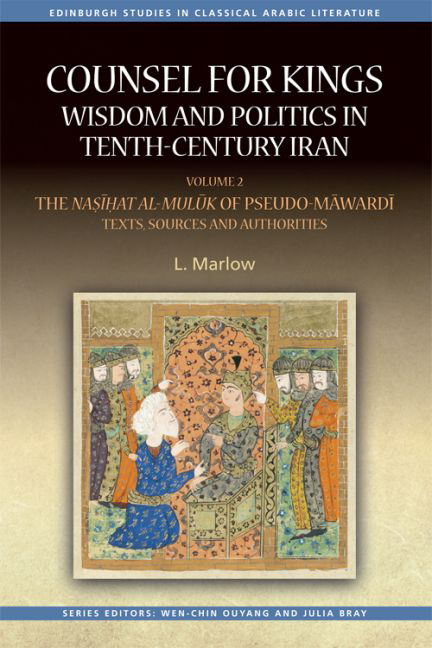 Counsel for Kings: Wisdom and Politics in Tenth-Century Iran
Counsel for Kings: Wisdom and Politics in Tenth-Century Iran 1 - The Presentation of Counsel
from Part I - The Cultural Landscape
Published online by Cambridge University Press: 07 October 2017
Summary
Mirrors for princes, an ancient and ubiquitous genre of literature, perform many functions for their authors and for their recipients. Authors addressed predictable themes and availed themselves of familiar materials, and the very durability of these elements across vast expanses of time and space lends an abstract and timeless appearance to their compositions. With reference to a significant example, this book seeks to demonstrate that mirrors nevertheless responded to specific historical moments and to the character and exigencies of specific relationships. In the context of the limits imposed by the inequality in power of author and recipient, it was, indeed, the appeal to perennial and universal wisdom that facilitated commentary in the present. Read within the context that Volume I attempted to establish, Naṣīḥat al-mulūk displays the highly particularised kind of communication that the mirror for princes made possible.
Structure and Literary Characteristics
Naṣīḥat al-mulūk is among the earliest book-length mirrors in Arabic. Its principal predecessor, the ninth-century Kitāb al-Tāj, approaches it in scale but differs from it in scope and complexity; extant tenth-century examples appear in smaller forms. Pseudo-Māwardī conceived of his composition as a ‘book’; he refers repeatedly to ‘this book of ours’ (kitābunā hādhā), and displays his presiding presence in the text by means of ample internal crossreferences. The mirror consists of ten thematic chapters. Pseudo-Māwardī's contemporary al-Yaʿqūbī (d. after 292/905) reported having seen a version of Kalīla wa-Dimna in ten chapters, a form also evident in the later tenth-century ‘Long Form’ of the Pseudo-Aristotelian Sirr al-asrār (‘Secret of Secrets’), the advisory text that, addressed to Alexander, includes political counsels and treats an eclectic set of topics deemed relevant to kings and the ruling elites, later known in Europe as Secretum secretorum. These two texts, the Arabic versions of which circulated across Eurasia and provided the basis for translations into numerous languages, including Persian, Turkish, Hebrew, Latin, Castilian, Provencal, French, English and German, were, with Bilawhar wa-Būdhā‚af, the most widely disseminated wisdom-related texts of the period. Ibn Qutayba (213–76/828–89) had adopted a subjectbased ten-part form for his anthology ʿUyūn al-akhbār (‘Choice Accounts’), the first ‘book’ of which is entitled the ‘Book of Authority’ (Kitāb al-Sulṭān).
- Type
- Chapter
- Information
- Counsel for Kings: Wisdom and Politics in Tenth-Century IranThe Nasihat al-muluk of Pseudo-Mawardi: Texts, Sources and Authorities, pp. 3 - 34Publisher: Edinburgh University PressPrint publication year: 2016


